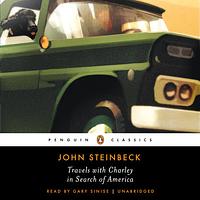Take a photo of a barcode or cover
adventurous
funny
informative
inspiring
reflective
relaxing
fast-paced
I have mixed feelings about this book. There were some parts that I think bring up interesting perspectives about America and people in general but there were several parts that made me uncomfortable whether it was the generalizations or other factors-perhaps that was Steinbeck's point? This is definitely a book of it's time (racist, sexist, and prejudicial moments aplenty) and yet there is a subtle struggle between maintaining life as it is/was and progressing toward where we are now.
The topics range from geography, politics, race, fidelity, religion, government policy, gender roles/expectations, socioeconomics, etc. I can appreciate his penchant for getting lost, and for traveling to explore and widen his understanding of the country/world. However, I found myself zoning out while listening (I listened to the audiobook) and often wasn't interested enough to rewind back to where I inadvertently stopped listening. There may be more value in reading a physical copy instead, but I don't see myself doing that, at least not for quite some time.
The topics range from geography, politics, race, fidelity, religion, government policy, gender roles/expectations, socioeconomics, etc. I can appreciate his penchant for getting lost, and for traveling to explore and widen his understanding of the country/world. However, I found myself zoning out while listening (I listened to the audiobook) and often wasn't interested enough to rewind back to where I inadvertently stopped listening. There may be more value in reading a physical copy instead, but I don't see myself doing that, at least not for quite some time.
adventurous
emotional
reflective
medium-paced
Ooh Steinbeck, how do I love thee? Let me count the ways..
Yes, this is a book about traveling across the U.S., for Steinbeck wanted to rediscover the country he had been writing about for most of his life.
But with this man, and his way with words, and thought, and observational skills, just makes it so much more.
A book for the vagabond, the wanderer, the traveler, rover, globetrotter, drifter.. even if you only are those things in your daydreams.
For people who want an insight in 1960s U.S., philosophy, nature, dogs and so on and so forth.
I especially thought the section about the deep South in the 60s, with the civil rights movement and school integration was moving, emotional, disturbing, sad, tragic and heartbreaking.
Yes, this is a book about traveling across the U.S., for Steinbeck wanted to rediscover the country he had been writing about for most of his life.
But with this man, and his way with words, and thought, and observational skills, just makes it so much more.
A book for the vagabond, the wanderer, the traveler, rover, globetrotter, drifter.. even if you only are those things in your daydreams.
For people who want an insight in 1960s U.S., philosophy, nature, dogs and so on and so forth.
I especially thought the section about the deep South in the 60s, with the civil rights movement and school integration was moving, emotional, disturbing, sad, tragic and heartbreaking.
A nonfiction book about Steinbeck and his poodle Charley's drive around America in 1960, Travels is dryly funny and hauntingly terrifying. Steinbeck was nearing 60 at the time and, by his own admission, finds himself often thinking wistfully about how things were. He's also very forward thinking and catches himself in this trap often. The entire Northern trip is fascinating, full of memorable encounters, some humorous, some sublime. The Southern return is over the top - Texas's larger-than-life largesse being unreal, and early '60's racial conflicts offering terrifying fears about the future. Even fifty years later...
Steinbeck's one of the greatest American writers, and perhaps my favorite, and this one's as beautifully crafted, as down-home comfortable in its telling, as insightful into the human condition as any he's written. Highly recommended.
Steinbeck's one of the greatest American writers, and perhaps my favorite, and this one's as beautifully crafted, as down-home comfortable in its telling, as insightful into the human condition as any he's written. Highly recommended.
Beautiful language. Travel through the South was especially powerful.
I want to marry John Steinbeck & have his babies. That's how much I loved this book. Yeah yeah, I know he's dead, but in my universe he's alive so I can sit down & chat with John & his gentleman poodle, Charley, in a camper/truck named Rocinante, and drink coffee with whiskey in it - & look at the scenery & talk about everything & nothing.
If you want to find out what America was like in 1962, this is your book. Steinbeck crosses what he calls the “great hives of production” – and then he mentions Youngstown, Cleveland, Akron, Pontiac and Flint. He makes friends with a man who starts off by accusing him of trespassing, & sits down for a drink with him. Throughout the book, for the most part Steinbeck talks to people he meets, finds commonality, & makes friends even with people who obviously disagree with his point of view. I wonder if that could even happen now?
I love John because he ruminates on the emotional state of his dog, without being maudlin. He hates sterilized hotel rooms where everything is covered in plastic. He gets lost, frequently but hilariously. He meets people who live full-time in RVs & is fascinated by them. He loves finding and listening to “regional speech,” which he realizes is going away. He imagines a man named Lonesome Harry who once stayed in a hotel room in Chicago. He doesn’t shoot coyotes.
I live in Oregon, & just about bust a gut laughing at this, written after John gets a flat tire on an Oregon highway. “It was obvious that the other tire might go at any moment, and it was raining and it was Sunday and it was Oregon. If the other tire blew, there we were, on a wet and lonesome road, having no recourse except to burst into tears and wait for death. And perhaps some kind birds might cover us with leaves.” That’s about the best description of any Oregon day that I’ve ever read!
Warning, there’s lots of use of “the n word” in this book – because it was used for real in the South in 1962 – and John doesn’t like the state of mind among the less educated southerners one bit. He writes that the way some whites treat blacks in the south raises a “weary, hopeless nausea” in him, & he’s not even a little bit funny about it, so all the gentle comedy of the book goes into hiding during this section. Again, I loved the book even more because Steinbeck didn’t try to soften the rough edges.
So if I ever decide to wander the countryside in a camper van, I’ll try to keep a full coffeepot & a bottle of whiskey, along with an open mind. Thank you, John & Charley!
If you want to find out what America was like in 1962, this is your book. Steinbeck crosses what he calls the “great hives of production” – and then he mentions Youngstown, Cleveland, Akron, Pontiac and Flint. He makes friends with a man who starts off by accusing him of trespassing, & sits down for a drink with him. Throughout the book, for the most part Steinbeck talks to people he meets, finds commonality, & makes friends even with people who obviously disagree with his point of view. I wonder if that could even happen now?
I love John because he ruminates on the emotional state of his dog, without being maudlin. He hates sterilized hotel rooms where everything is covered in plastic. He gets lost, frequently but hilariously. He meets people who live full-time in RVs & is fascinated by them. He loves finding and listening to “regional speech,” which he realizes is going away. He imagines a man named Lonesome Harry who once stayed in a hotel room in Chicago. He doesn’t shoot coyotes.
I live in Oregon, & just about bust a gut laughing at this, written after John gets a flat tire on an Oregon highway. “It was obvious that the other tire might go at any moment, and it was raining and it was Sunday and it was Oregon. If the other tire blew, there we were, on a wet and lonesome road, having no recourse except to burst into tears and wait for death. And perhaps some kind birds might cover us with leaves.” That’s about the best description of any Oregon day that I’ve ever read!
Warning, there’s lots of use of “the n word” in this book – because it was used for real in the South in 1962 – and John doesn’t like the state of mind among the less educated southerners one bit. He writes that the way some whites treat blacks in the south raises a “weary, hopeless nausea” in him, & he’s not even a little bit funny about it, so all the gentle comedy of the book goes into hiding during this section. Again, I loved the book even more because Steinbeck didn’t try to soften the rough edges.
So if I ever decide to wander the countryside in a camper van, I’ll try to keep a full coffeepot & a bottle of whiskey, along with an open mind. Thank you, John & Charley!
adventurous
inspiring
lighthearted
reflective
relaxing
fast-paced
Favourite book I’ve read in a long time. Super relaxing to read the more descriptive passages. Beautiful and I loved it from the start to the end. I’d love to do this at some point in my life
This book is a brilliant and still-relevant reflection upon America and American character by a master stylist and wit. Most of the story consists of pastiches that reflect upon the differences and similarities of Americans as Steinbeck travelled across the country late in life (this was his next to last book). There is apparently a debate about how much of the book is factual --- apparently a travelogue is supposed to be --- and how much Steinbeck invented. I don't think it matters; what comes through the book is Steinbeck's keen perception that is really engaging, with the fiction perhaps revealing the underlying truth. I enjoyed the obvious connections Steinbeck makes with Thoreau and Cervantes, and the book rarely dragged. Recommended.
If you want to read a book about race in America, read this. Warning: use of the n-word is made. Bear with me on this. John Steinbeck in 1960 went on a tour of the US with his dog alone. He comments on what he sees from the beauty of Wisconsin to the desegregation of a school in NOLA. This is a glimpse in time. JFK is running for office. There are no interstate highways. We didn’t recycle much.
Does Steinbeck get tired of the trip? Oh yeah. Very obvious. Does his writing change as his opinion of the trip changes? Yup. Are his comments on race something for today’s discussions? Yes.
I first read this in junior high, but as an adult, I am fascinated by this moment, frozen by one of our greatest authors. So what if he got lost in MN and missed the best of it. I’ll forgive him that!
Does Steinbeck get tired of the trip? Oh yeah. Very obvious. Does his writing change as his opinion of the trip changes? Yup. Are his comments on race something for today’s discussions? Yes.
I first read this in junior high, but as an adult, I am fascinated by this moment, frozen by one of our greatest authors. So what if he got lost in MN and missed the best of it. I’ll forgive him that!




